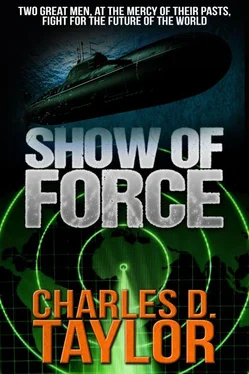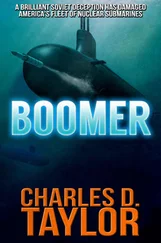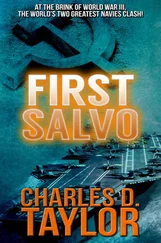Collier knew what he and Ambassador Simpson had to do. It would be a bluff that Gorenko might or might not accept. But they had to make the Russians think that there were still some communications with Washington. His aide had contacted Gorenko, and they had been granted an appointment with the Commander in Chief of the Soviet Navy. But the terms were his. While they were not officially under house arrest, which the Russians would never openly admit, the K.G.B. was ensuring that no one from the embassy would leave unless the Russians wanted them to go. They were to be picked up by one of the long, black limousines with shaded windows that were forever passing through the Kremlin walls at all hours of the day and night.
When Ambassador Simpson stepped out of the elevator onto the ground-floor lobby of the American Embassy, he found Bob Collier already waiting for him, seated in one of the many cushioned chairs in the corner farthest from the main entrance. "I didn't mean to keep you, Bob," he remarked, seating himself next to the Admiral. "I wanted to spend a few minutes with some of my people, just to review what we think the Russians might know at this stage of the game."
"That's something we're just going to have to bluff our way through, sir. They know damn well there's no Trident base going in down there, and I'm sure Gorenko doesn't think we believe that speech either. This meeting is going to be based on how much he thinks he can bluff us."
"One of the concerns my men mentioned was Colonel Hamlet. We know they've had more than enough time to make him talk."
"I don't think you have to worry about that aspect, sir. He was in charge of the Marines here, and he was an intelligence expert whose prime mission was to gain as much information as possible about weapons development. He can probably tell them more than they want to know about their own weapons systems, but he knows nothing about Islas Piedras." Then he added gravely; "Which could be unfortunate for him."
"Urn… yes, too bad," replied Simpson, aware of the interrogation that Hamlet might still be under. "Bob, I guess what bothers me most at this point is simply that I don't speak Russian well. All my life I have been able to hold my own because I can talk directly with my opposite number. Facial expressions, intonation, all of those little signs are things I've taken advantage of. And now, when I think I'm correct in saying that I'm involved in the most crucial challenge of my career, I'm going to be sitting next to you, waiting for your translation, hoping I can put expressions and voice changes together." He looked over at the naval officer beside him, dressed now in the Admiral's uniform, which he rarely wore in the Soviet Union. "The other thing my aides were doing was something I should have done myself when you first arrived for duty, study your background." He leaned forward in his chair. "Bob, I'm going to have to trust you implicitly in Gorenko's office," and he raised a finger for emphasis leaning slightly forward toward the other man, "not because I have no choice, but because I am as sure as I'll ever be that you can function as well for me as I could myself."
Collier said nothing for a moment, then, "I thank you for your confidence, sir. But," he hastened to add, "I've never been in a position like this before regardless of the language they're speaking. I'm a naval officer, not a diplomat."
"Bob, whenever an attache is assigned to an embassy as critical as this one, we know he has been specially selected, and we are forwarded-reports by the man's superiors. Before I was given this job, I had the opportunity in the late seventies to spend a few days at the Naval War College in Newport. It was probably the best three days I ever spent as far as understanding my own military. I attended lectures… rubbed elbows with a lot of brass," he mused. "But, more important, I was able to talk with some senior officers. They really changed my mind about the so-called military attitude being all-pervasive throughout the service. There were some men I talked with, some of whom are running the military today, who were well-educated and capable of independent thought. And the man who was president of the college at that time was Vice Admiral Stockdale, who took the time to explain what his students were doing there."
He paused and looked thoughtful for a minute. "He was probably the man who impressed me most. You know him. You were there about the same time. He was a senior navy pilot shot down over Vietnam and a prisoner of war for years. He continued to lead men regardless of what the VC did to him. And he came back and started his career right from where he had left off, stronger mentally than most men. While I was impressed with his mind, I guess I was more impressed by his inner strength, his convictions about the country… about moral values. He made a speech there that was later published in the Review about personal responsibility and moral principles that I never forgot. And I decided right there and then, Bob, that he was influencing men I could respect." He paused. "The strongest recommendation on that record of yours is from Admiral Stockdale."
"I didn't know about that, sir."
"Well, you do now. I just want you to know that you will speak for both of us, for me, for the country, if you will, and you need not hesitate in your discussions with Gorenko. I want you to translate when you feel you should, but perhaps it's just as well if he is unsure of our relationship in these talks. Let's start out by having him think we may need some moments of privacy to talk, and then let's surprise him by you making a decision on the spot if you desire."
"Thank you very much, Mr. Simpson. I think I know Gorenko well enough so that you can trust me." He smiled, looking first at his hands folded in his lap, then back at the ambassador. "This isn't quite what I expected when I thought I was going to become an old sea dog, but I guess it's the best way I can help David Charles right now."
"I take it you are acquainted with Admiral Charles?"
"David and I served together on the same ship, over twenty years ago." He paused for a moment, then looked up, "Sam Carter was the CO." He grinned at the ambassador. "We all left the ship at about the same time…must have been a vintage year." He nodded in the direction of the front entrance, where a marine was motioning to him. "It looks like our car awaits us."
"Okay, Bob. Remember, straight faces and strong tongues."
The black car was waiting right outside the embassy doors, facing south toward the Moscow River. Blockades set up by Russian soldiers held back the crowds of curious civilians who had begun to collect since the Chairman's speech. More than likely, Collier thought, the K.G.B. collected them for the occasion, probably take pictures of them to put on the photo wires for worldwide distribution. He could imagine the captions that would be provided.
The car swung rapidly onto Tschaikowskistrasse, following another black, more official-looking car with flashing lights. They turned left on Kalinina Prospect, racing past the Gorki Museum that Collier had enjoyed so much during his frequent walks. Then, much faster than he had expected, they were past the Lenin Library on their right, across Marx Prospect, which had been kept open for them, and through the gate by the Alexander Garden facing the Church of the Assumption. The car halted before the building where Gorenko's office was located, probably braking for the first time when it stopped there, The door was yanked open instantly by a guard standing at attention, right hand at his visor. Ambassador Simpson stepped out first,' and as Collier followed, the salute was dropped without ever being returned. So much for protocol, thought Collier. Their rank and privilege had been acknowledged. Further respect had been dropped. The tone of the meeting had been set.
Читать дальше












